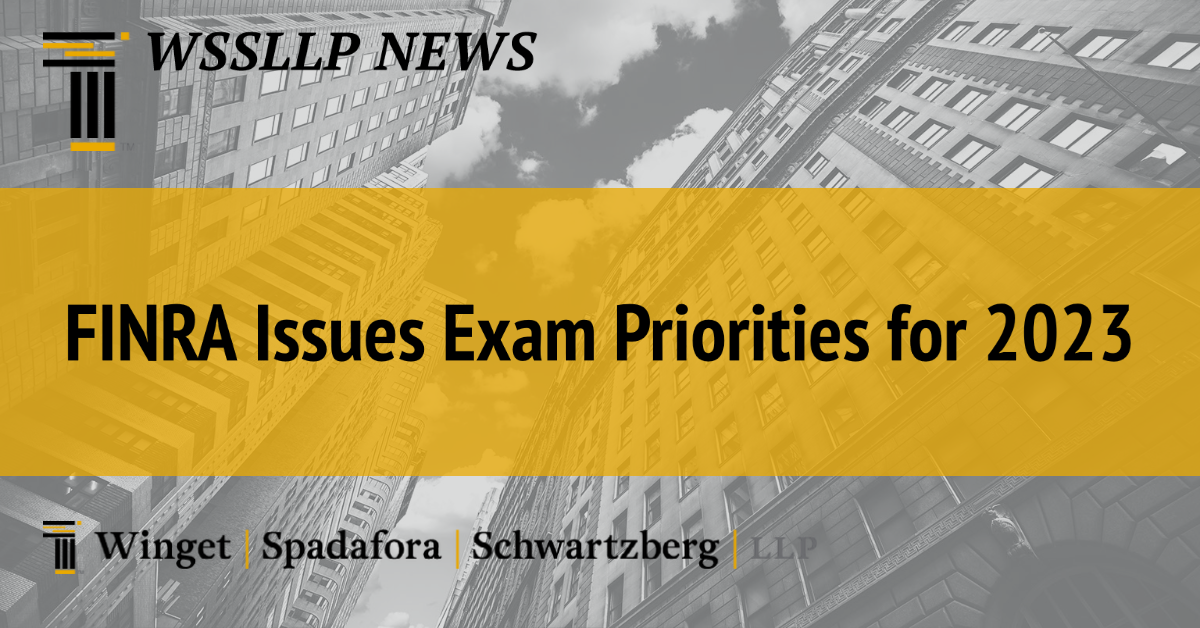On January 10, 2023, the Financial Industry Regulatory Authority (“FINRA”) released its 2023 Examination and Risk Monitoring Program Report. The report “provides member firms with insight into findings from the recent oversight activities of FINRA’s Member Supervision, Market Regulation and Enforcement programs.”[1] The report is published to promote greater transparency to member firms as well as the public regarding FINRA’s regulatory activities and programs. A link to the report can be found here.
New Areas Covered in 2023
- Manipulative Trading: As a result of FINRA’s findings related to inadequate WSPs, non-specific surveillance thresholds and surveillance deficiencies, it identified six effective practices that firms should implement going forward. The six effective practices relate to: (1) Manipulative Schemes; (2) Multiple Platform and Product Monitoring; (3) Algorithmic Trading; (4) momentum Ignition Trading; (5) ETPs; and (6) Wash Trading.
- Fixed Income – Fair Pricing: FINRA has found that many member-firms have incorrect determination of prevailing market prices, outdated mark-up/mark-down grids, fail to consider the impact of mark-up on yield to maturity, and unreasonable supervision. FINRA has suggested three effective practices to address these concerns: (1) the implementation of prevailing market prices documentations; (2) conducting mark-up/mark-down reviews; and (3) the use of exception reports or outside vendor software to ensure compliance with FINRA Rule 2121 or MSRB G-30.
- Fractional Shares – Reporting and Order Handling: FINRA has noticed firms failing to report to a FINRA trade reporting facility (TRF) or FINRA’s over-the-counter trade reporting facility (ORF) for fractional share transactions. Additionally, FINRA has found that firms have failed to effectively implement supervisory systems and procedures to confirm that fractional share transactions are properly reported as required. FINRA recommends the following effective practices to moderate these issues: (1) reviewing FINRA resources on fractional share execution and reporting; (2) reviewing firms’ dividend reinvestment processes to ensure fractional share transactions are properly reported; (3) establishing and maintaining supervisory processes that address fractional share orders, order routing, and execution; (4) confirming adequate system capacity to report trades to a TRF or ORF within seconds, and verifying that data is reported accurately and completely; and (5) including fractional share orders in execution reviews.
- Regulation SHO: FINRA has identified failures to distinguish bona fide market making from other proprietary trading activities which are not eligible to rely on Regulation SHO’s bona fide market making exceptions. FINRA also noted firms’ impermissible reuse of locates for intraday buy-to-cover trades. In response, FINRA proposes enhanced supervisory procedures with respect to bona fide market making and the reuse of locates. Specifically, considering: (1) where and how the firm’s quotes are placed; (2) the frequency or timing of the firm’s quoting activity; and (3) the level of the firm’s proprietary trades compared to customer transactions filled. And for reuse of locates: (1) using hard blocks on threshold securities, or easy to borrow lists, as limits on reuse; and (2) confirming that agreements with locate providers specify how long the locates are valid for.
Selected Highlights in 2023[2]
In 2023, FINRA will also be focusing extra attention to the following areas to ensure member-firms compliance:
- Regulation Best Interest (Reg BI) and Form CRS: FINRA continues to focus on firms’ adherence to REG BI. Specifically, FINRA emphasizes member-firms’ obligations to review their compliance practices with regarding to REG BI, and consider all new interpretive guidance from the SEC.
- Consolidated Audit Trail (CAT): While firms’ overall compliance with CAT reporting requirements remains high, FINRA continues to evaluate member firms that receive or originate orders in National Market System (NMS) stocks, over-the-counter (OTC) equity securities, and listed options.
- Order Handling, Best Execution and Conflicts of interest: FINRA continues to emphasize this area and has implemented targeted regulatory efforts in recent years. FINRA’s review of compliance with best execution regulations includes assessments on whether member firms are fully and promptly executing marketable customer orders, adequately conducting periodic reviews, and disclosing the specific terms of any profit-sharing relationships with venues to which they route orders.
- Mobile Apps: FINRA notes that with the use of mobile apps becoming more commonplace, the potential risks associated become more significant. There are concerns about mobile apps encouraging retail investors to engage in trading strategies that may be inconsistent with their investment profiles. Additionally, FINRA continues to closely monitor how mobile apps disclose and explain the risks of higher-risk products and services.
- Cybersecurity: Cybersecurity represents one of the principal operational risks facing broker-dealers. Because the frequency, sophistication and variety of cyberattacks continues to increase, it remains an area of high priority. Last year, FINRA established the Cyber and Analytics Unit (CAU) to enhance its ability to address the cyber threat landscape. FINRA will continue to diligently examine member firms’ cybersecurity risk management and alert member firms of potential cybersecurity threats.
- Complex Products and Options: FINRA will continue to assess whether firms’ recommendations of complex products are in the best interest of retail customers and whether the recommendations are in line with customers’ investment profiles and risk tolerance. In doing so, FINRA will review firms’ communications and disclosures to customers regarding complex products, as well as customer account activity. FINRA has recently placed an emphasis on monitoring crypto assets and options trading.
Winget, Spadafora & Schwartzberg, LLP and its Securities Practice Group are constantly monitoring new guidance from FINRA, the SEC and state regulators to ensure our clients’ needs can be met and their remain in compliance with all applicable rules. Should you have any questions regarding FINRA’s examination priorities for 2023, please contact a member of our firm’s Securities Practice Group.
[1] 2023 Report on FINRA’s Examination and Risk Monitoring Program
[2] https://www.finra.org/rules-guidance/guidance/reports/2023-finras-examination-and-risk-monitoring-program/selected-highlights






